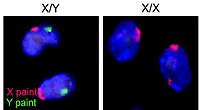
Photo from wikipedia
There is strong evidence indicating that smoking has negative effects on female reproductive health. Studies to investigate the effects of female smoking on IVF outcomes have been conducted by several… Click to show full abstract
There is strong evidence indicating that smoking has negative effects on female reproductive health. Studies to investigate the effects of female smoking on IVF outcomes have been conducted by several research groups, yet the results are controversial. To evaluate the impacts of female smoking on the outcomes of assisted reproduction, a meta-analysis was performed, which included studies published in English up to September 6, 2017 from the MEDLINE, EMBASE, and Cochrane library databases. Twenty-eight studies encompassing 5009 female smokers seeking assisted reproduction and 10,078 non-smokers were used in this meta-analysis. Significant negative outcomes were detected in the female smokers compared with non-smokers including decreases in live birth rate per cycle (OR=0.52, 95% CI 0.37-0.74), in clinical pregnancy rate per cycle (OR 0.59, 95% CI 0.51-0.68), in number of retrieved oocytes (MD=-0.87, 95% CI -1.39 to -0.25), and in average fertilization rate (MD=-4.80, 95% CI -8.49 to -2.02), as well as a significantly increased miscarriage rate per pregnancy (OR=2.48, 95% CI 1.79-3.43). In conclusion, the current meta-analysis provides compelling evidence that female smoking has a significantly negative impact on the outcomes of assisted reproductive technology (ART) and strongly recommends that female smokers will greatly benefit from a smoking cessation before employing ART to become pregnant.
Journal Title: Journal of gynecology obstetrics and human reproduction
Year Published: 2018
Link to full text (if available)
Share on Social Media: Sign Up to like & get
recommendations!